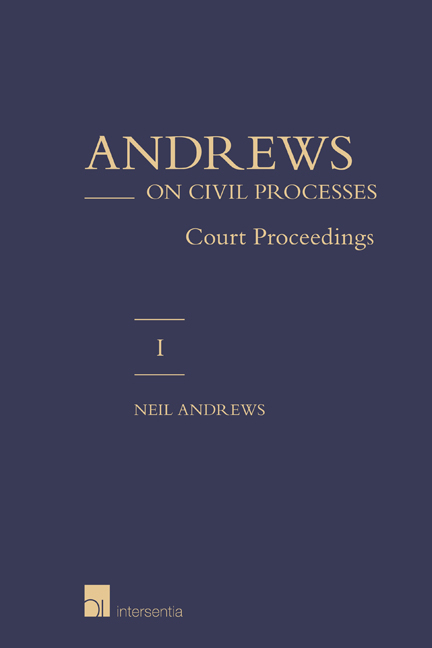Book contents
- Frontmatter
- Dedication
- Epigraph
- Preface
- Contents
- Table of Cases
- Table of Statutes
- Table of Statutory Instruments
- PART I INTRODUCTION TO THE FORMS OF CIVIL JUSTICE
- PART II COMMENCEMENT OF COURT PROCEEDINGS AND PREPARATION FOR TRIAL
- PART III END-GAME: TRIAL, APPEAL, FINALITY AND ENFORCEMENT
- PART IV COSTS AND FINANCING OF LITIGATION
- PART V SPECIAL PROCEEDINGS
- Chapter 21 Protective Relief
- Chapter 22 Multi-Party Litigation
- Chapter 23 Complex Litigation
- Chapter 24 The Commercial Court
- PART VI PRINCIPLES OF CIVIL LITIGATION
- PART VII THE EUROPEAN CONTEXT
- Select Bibliography
- Index to Volumes I and II
Chapter 21 - Protective Relief
from PART V - SPECIAL PROCEEDINGS
Published online by Cambridge University Press: 13 December 2017
- Frontmatter
- Dedication
- Epigraph
- Preface
- Contents
- Table of Cases
- Table of Statutes
- Table of Statutory Instruments
- PART I INTRODUCTION TO THE FORMS OF CIVIL JUSTICE
- PART II COMMENCEMENT OF COURT PROCEEDINGS AND PREPARATION FOR TRIAL
- PART III END-GAME: TRIAL, APPEAL, FINALITY AND ENFORCEMENT
- PART IV COSTS AND FINANCING OF LITIGATION
- PART V SPECIAL PROCEEDINGS
- Chapter 21 Protective Relief
- Chapter 22 Multi-Party Litigation
- Chapter 23 Complex Litigation
- Chapter 24 The Commercial Court
- PART VI PRINCIPLES OF CIVIL LITIGATION
- PART VII THE EUROPEAN CONTEXT
- Select Bibliography
- Index to Volumes I and II
Summary
INTRODUCTION
Protective relief concerns judicial orders granted for the purpose of safeguarding the claimant's interests. Such relief takes two main forms: (i) orders for the freezing of the defendant's assets (freezing injunctions, formerly Mareva injunctions); and (ii) orders for the seizure and preservation of evidence (civil search orders, formerly Anton Piller orders). A minor form is the seizure of passports by civil order (21.71 to 21.72).
Injunctions in these procedural contexts are intended to ensure that attempts to vindicate substantive justice are not thwarted by cynical obstructive tactics – most commonly dissipating assets, destroying evidence, or personally absconding from the jurisdiction.
Both freezing relief and civil search orders are more commonly applied before commencement of the main proceedings, and they are nearly always issued ‘without notice’ to the respondent (to use the former terminology, they are awarded ex parte).
The foundation for these orders is the general statutory power to issue injunctions, that is, orders backed by powerful threats. This general power has been a fertile source of judicial creativity. This generic remedy has been adopted to counter many types of misconduct, including wrongs threatening to sap or frustrate the civil process.
FREEZING RELIEF
NATURE OF FREEZING INJUNCTIONS
This is an in personam order (an order addressed personally to the respondent) requiring the respondent to refrain from dealing with his assets.
This relief does not give the applicant any proprietary interest in the defendant's assets. The in personam operation of freezing relief has been noted in numerous cases. The Court of Appeal in Kastner v. Jason (2004) noted this facet of freezing relief, in the context of an arbitration (the court held that, consistent with the operation of freezing relief in court proceedings, an arbitral tribunal could not be regarded as having created a proprietary charge or lien or other proprietary right in respect of assets covered by an anti-dissipation order). It followed that the creditor could not register an effective caution against land which was the subject of the arbitral tribunal's anti-alienation or anti-dissipation order.
The rationale for this English approach is that the creditor should not be entitled to gain priority in the pursuit of the debtor's assets.
- Type
- Chapter
- Information
- Andrews on Civil ProcessesCourt Proceedings, pp. 587 - 618Publisher: IntersentiaPrint publication year: 2013

